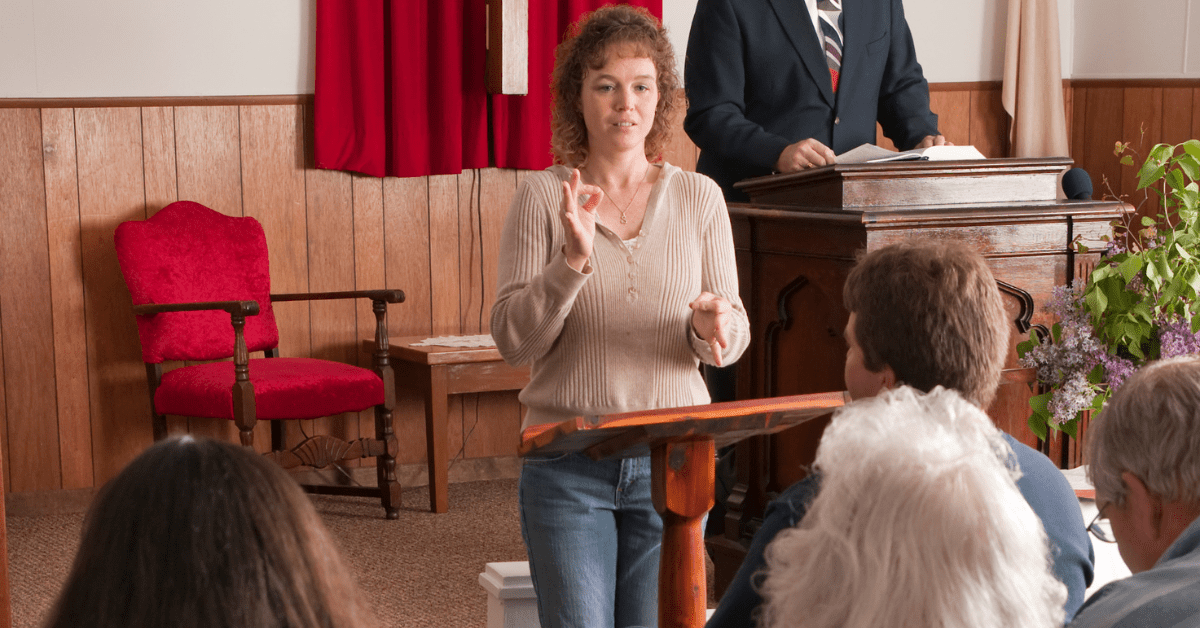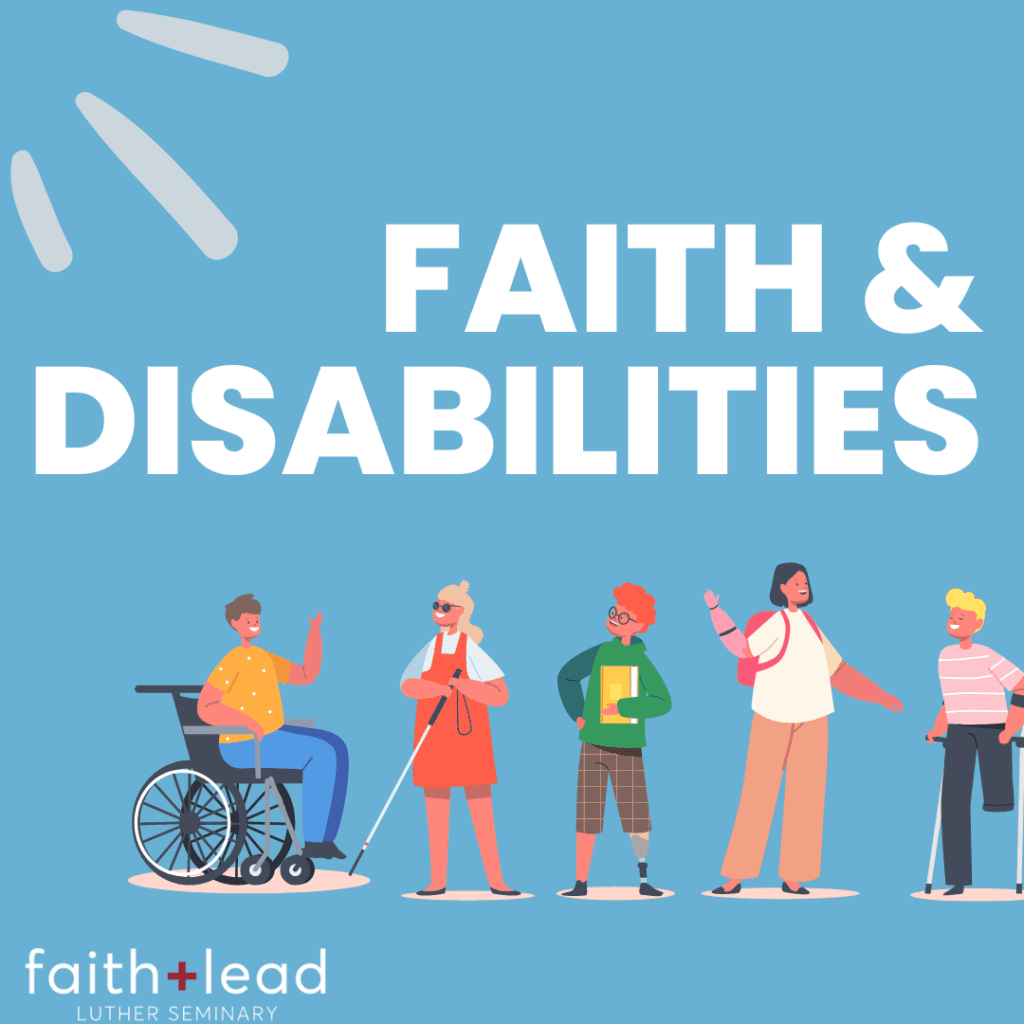Several years ago, while I was serving the Episcopal Deaf church in the Diocese of Washington, DC,* a new priest moved into my neighborhood. I sent a “welcome!” email—and they asked how they could help my ministry. They misunderstood. As the Deaf priest in a town with a substantial D/deaf** population, I was reaching out to see if they needed my help. The Deaf church had a minority identity and language skills that no one else had. I was frequently disheartened that we were seen as a parish to be helped rather than as a people with unique expertise.
This is a dynamic I have noticed my entire life. I am really lucky—my father shares my kind of deafness. Fewer than 10% of D/deaf people are born to D/deaf people. I am incredibly fortunate to have parents who already had it figured out before I came along. But it didn’t matter that deafness wasn’t a problem in our house. Hearing people tend to see me as someone less capable who needs their help.
The change that I pray for in our world is for a blessing of equity, where my deafness is part of me and yet I am able to contribute to my work, my faith, and my world on the same level as anyone else. More than once, I’ve overheard a church board member explaining that I was an excellent diversity hire and the church was lucky to have me … in that order. D/deaf persons have much to offer, beyond our insight into existing in a body with non-standard hearing. We have the capability to contribute to society as people with multifaceted, intersectional identities.
Hope for equity from the pandemic
Recent history has given me hope for seeing increased equity in my lifetime. The COVID-19 pandemic has been unquestionably horrible. But some positive changes have begun within the last 28 months.
Only weeks after the pandemic started, my friend and predecessor, the Rev. Jay Croft, died after a long illness. He was the longest-serving Deaf Episcopal priest in over a century. Hundreds of people flooded my inbox asking about funeral arrangements. Suddenly, my parish had to figure out how to host a funeral during a health-emergency lockdown. I raided my church like a bandit in gloves and a mask to get our altar cross and the urn pall. I read up on forced perspective to learn how to set up my dining table in a tiny city apartment so it would look like a flower-filled holy space. (Hot tip: stack your bike in your kitchen and use your wall bike rack as a banner stand.) The Diocese and I worked together to host over 400 people on a Zoom webinar service with ASL interpreters, closed captioning, and voicing.
Following that funeral, I consulted for other churches hosting their first pandemic funerals. Did I consult just to help them with interpreters? No, actually. They were hearing churches and didn’t need that. They needed help figuring out how to host on Zoom, how to highlight speakers, how to provide closed captioning and share videos, and how to craft a funeral liturgy that made theological sense. That’s all stuff that we know how to do now, but in 2020, my church had to figure it out first. The Deaf community was able to help other churches figure out how to do video-church on a large scale. This is what I mean when I talk about equity—that we aren’t just asked to help for “D/deaf stuff”, but because we know how to do something and can teach others.
What is healing really about?
Let’s talk a little bit about how we understand a disability with a theological mindset. Is deafness an absence of something? Often, hearing people think of hearing aids and cochlear implants as “restoration” of a sense, and that restoration of sense is the same as a miracle. Miracles are blessings from God, right? If a miracle restores a sense, does that mean that absence of a sense is the absence of miracle, the absence of blessing?
The gospels are often understood to contain stories of miracles in which restoration is the dramatic act through which Jesus displays blessing. Because I am a person with no hearing, I tend to interpret those scriptures a little differently. Consider the videos of cochlear implant activation, which are often shared as “a miracle!” It will help to know that deafness comes in many varieties, and the cochlear implant doesn’t help all of us. My type of deafness is fairly responsive to a cochlear implant so I can get a pretty good functional approximation of sound, but sound isn’t all that the hearing people have cracked it up to be. Cochlear-implant-sound is not the same as biological sound. Deaf-quiet is not the same as sensory-deprivation. So when I see cochlear implants turned on, I see the beginning of a long rehab process to learn to use a tool, not a miracle restoration of an absence.
Are the healing miracles not about absence and restoration as blessing? There’s a great story (Mark 7:31-37) about a Deaf man. The part I love most is how Jesus uses gestures first—he touches his tongue and points. Notice that Jesus—before healing—always seeks consent and communication. With the Deaf man, he uses tactile senses and gestures to communicate before he offers “be opened”.
That phrasing—“be opened”—is important. Jesus didn’t say “be healed” or “be whole” in this case. To me, that speaks to the gift of communicating with others—not mere sensory restoration. It is true that Deafness makes it harder to communicate clearly. Even in the signing community, we ask each other to repeat and rephrase all the time. When we lack language, we lack community. If miracles are about restoring the absence of something, then perhaps the miracle is “Be opened”, or restoring the person to community.
Your turn: Consider D/deaf folks like everyone else
I feel as though it is a natural urge for many people of faith to want to help those they perceive as less fortunate. But what if people like me, like the D/deaf, like a disabled person, are not less fortunate? My cochlear implant is a blessing, because it did not make me not-D/deaf. Jesus would not take away my cochlear and force biological hearing on me, I think. The miracle would be him leading the church to a more Godly community where I would never again be “the diversity hire!”, but only myself.
What if God sees Godself expressed fully and without error in people like me? For we who do not hear, living with D/deafness shapes our world, shapes our faith, shapes our work. Deafness gives us a unique and powerful perspective, even beyond basic “disability issues”. D/deaf people want to be on the regular committees, the finance committees, the worship and music committees, the Vestries, the boards. We want to be asked to stand for election to Diocesan/synod/regional positions. The majority, non-D/deaf community can start with extending those invitations. What if God’s dream for the world includes us fully in community, just as we each are?
Notes:
*St. Barnabas Episcopal Deaf Church is the second-oldest Deaf church in the Episcopal church, which was the first denomination to ordain Deaf people to the clergy. They share a campus with Church of the Ascension, a multilingual Episcopal church in Gaithersburg Maryland. The Episcopal Conference of the Deaf continues to advocate for the full inclusion of Deaf people within the church, and to develop innovative worship such as the All-ECD Zoom worship services in which all the ECD missions in the US gathered to share worship in ASL during the time of the pandemic lock-downs.
**The grammatical use of D/deaf is intended to indicate the wide variety of D/deaf identity. Generally, “big D” Deaf was used to refer to individuals who used ASL as a primary language, who may have grown up in a Deaf school within an all-Deaf community. “little d” deaf referred to those who were “mainstreamed”, raised orally, often without access to ASL, or who wore hearing aids or used cochlear implants. The D/deaf community has changed in many ways, in part due to the mainstreaming of deaf children in hearing school, and to the advent of cochlear implants and pediatric implantation. As a result, many people make choices about language or discover signed languages later in life, and many more children are now raised with simultaneous manual and spoken languages. D/deaf (sometimes written as d/Deaf) captures the wide variety of Deaf identity.




